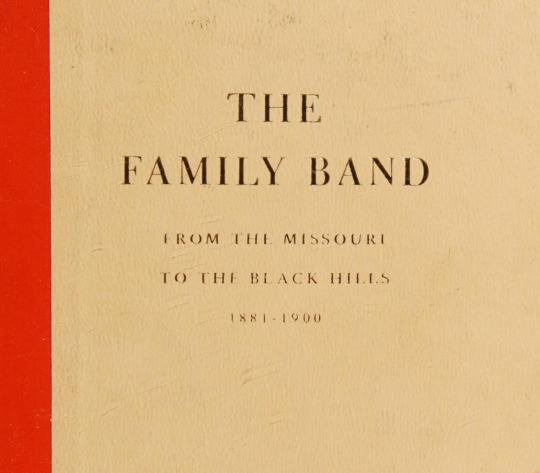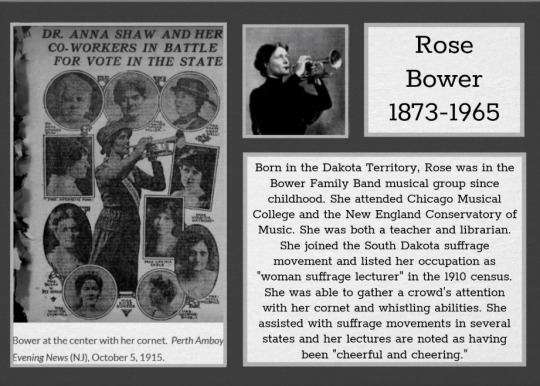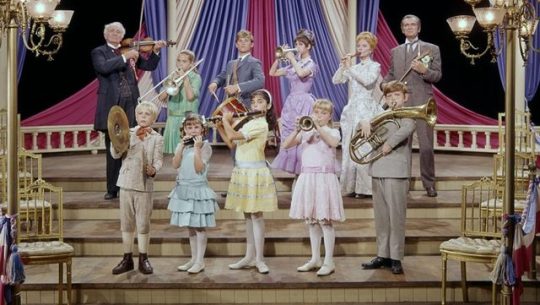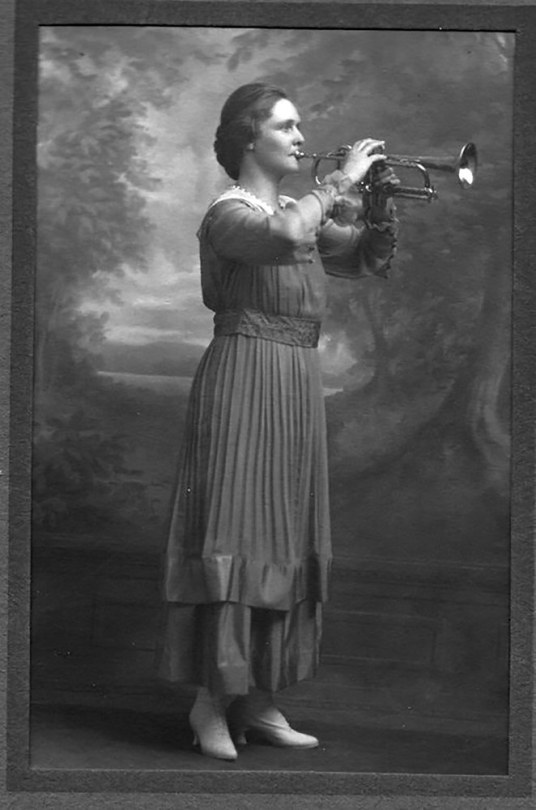#Laura Bower Van Nuys
Text

An absolutely phenomenal biography detailing the life of a pioneer family in South Dakota in the late 1800s!
Highly recommend for any American pioneer history buffs
#The family band#1800s#1881#1900#bower family#book#american history#the dakotas#south dakota#pioneer#pioneer history#history#biography#The One and Only#Genuine#Original#Family Band#The Family Band: from the Missouri to the Black Hills#1881-1900 by Laura Bower Van Nuys#Laura Bower Van Nuys#1881-1900#1801
0 notes
Text
Rose Bower

51. Rose Bower (1873-1965) Born in the Dakota Territory, Rose grew up playing in the Bower Family Band. She attended the Chicago Musical College and the New England Conservatory of Music. She was both a teacher and librarian. She joined the South Dakota Suffrage movement and listed her occupation as “woman suffrage lecturer” on the 1910 census.
She is most notably remembered for her work with Carrie Chapman Catt, who recruited her for help with the Empire State Campaign in New York and other states. She was a gifted fundraiser for suffrage. Not only were her lectures cheerful and charming but her musical and whistling abilities were a crowd favorite. She would tell them that they had to donate to the cause before she would perform for them.
The Bower Family Band was very popular and famous during the late 1800s. The youngest daughter, Laura Bower Van Nuys, wrote a biography about them in 1961. Walt Disney Studios bought the rights to her book and produced a film in 1968 called “Genuine Original Family Band” with an all star cast which was based on the family and has a plot line centered around the politics of the 1888 presidential election! (Rose is the 12 yr old blonde girl and only has one line in the movie but it is based on her family.)
Sources:
https://suffragistmemorial.org/rose-bower-may-16-1873-july-6-1965/
https://historysouthdakota.wordpress.com/womens-suffrage-in-sodak/biographies-of-womens-suffrage/rose-bower/
https://disney.fandom.com/wiki/The_One_and_Only,_Genuine,_Original_Family_Band
#WCW#suffragettecity100#fightforthe19th#Rose Bower#bower Family band#Genuine original family band#family band#musicteacher#women in music#suffrage#suffragist#suffragette#new York History#south Dakota#rapid city#dakota territory#dakota history#cornet#women musicians#whistler#empire state campaign#Carrie Chapman Catt#19th amendment
0 notes
Photo

The One and Only, Genuine, Original Family Band (1968)
Hardcore Disney fans know how crucial Richard M. Sherman and Robert B. Sherman – the Sherman Brothers – were to Walt Disney Studios in the 1960s. From Mary Poppins (1964) The Jungle Book (1967), the Winnie the Pooh films, and numerous songs for Disney theme parks – most notably “It’s a Small World (After All)”. But did you know the Shermans were behind a musical about a Missourian family that moves to the Dakota Territory with the United States presidential election of 1888 as a backdrop? This is not figment of my imagination, but Michael O’Herlihy’s The One and Only, Genuine, Original Family Band. Yes, that title is too long. Tough!
The film aired as part of Turner Classic Movies’ (TCM) occasional Treasures from the Disney Vault bloc on March 29 and has not been released on home media since 2004. This review is based on the print that aired on TCM, which was presented in the correct screen aspect ratio (1.85:1) – unlike the 2004 DVD release (previous releases were 1981 on VHS and 1982 on LaserDisc). The film has been buried deep in the Disney Vault and thus has barely seen the light of day. That is not any fault of the film – imperfect as it is – itself, but a perception it would not make any money nowadays for the House of Mouse (given their financial health these days, Disney’s refusal to make its most obscure titles more accessible annoys me). Nevertheless, spelunking into the least-visited crevices of the Disney Vault always uncovers something worthwhile, and that includes this film.
Patriarch Renssaeler Bower (Walter Brennan, acting in his usual role as a boisterous elder) is the leader of the family band – including his son Calvin (Buddy Ebsen), daughter-in-law Katie (Janet Blair), and grandchildren Alice (Lesley Ann Warren), Sidney (Kurt Russell), Lulu (Debbie Smith), Mayo (Bobby Riha), Nettie (Smith Wordes), Rose (Heidi Rook), Quinn (Jon Walmsley), and Laura (Pamelyn Ferdin). Grandpa Bower, a lifelong Democrat and Confederate veteran of the Civil War (this is before the GOP and Democrats became the parties – ideologically, racially – that they are today), petitions the Democratic National Committee to perform at the 1888 convention in St. Louis. Their song is accepted, but Alice’s boyfriend Joe Carder (John Davidson) convinces the family to move to Dakota Territory – which is heavily Republican (“Reee-publican” to Grandpa Bower). Political tensions simmer underneath the front of a musically harmonious family. Where Calvin and Katie Bower are both Republicans but not terribly political, Joe’s firebrand dedication to the GOP and Alice’s love for him make life uncomfortable for Grandpa Bower – whose actions in Dakota Territory jeopardize Joe and Alice’s relationship. Things come to a head on Election Day: incumbent Republican Grover Cleveland (after one term) versus Democratic challenger Benjamin Harrison.
I do have one question above all. If Grandpa Bower was so invested in electing Cleveland, why did he allow the family to move to Dakota Territory? After all, territories have no say in presidential elections!
Within Family Band’s 110-minute runtime, the Sherman Brothers are able to pack in nine songs (excluding reprises) of hopefulness, wholesome romance, and American political mythos – the last of which the Shermans never attempted before this film or after. It is a decent musical score which ends weakly, but not without some genuine musical marvels. The titular song (the video provided in that link does not contain the entire song) appears immediately after the opening titles showcases a Walter Brennan who does not know how to conduct. Otherwise, the song should exemplify exactly what the viewer should be expecting: a light-hearted musical family film. Moments later, Alice receives a letter from Joe – whom she has never met; for younger readers, know that before there was online dating, newspaper dating was a thing – and breaks out into “The Happiest Girl Alive”. That is two songs within the film’s first 5 minutes. Lesley Ann Warren’s expressive, strong voice lends so much emotion to a beautiful, ponderous song placed too early in this movie. “The Happiest Girl Alive” is about an introspective young woman who has never known romantic love and is nervous to meet the fellow she has exchanged love letters with. The song is riddled with questions of self-doubt and self-worth, and it takes Alice ninety seconds to sing the song’s title (after singing the following, notice how her body opens to the camera, how her movements become freer as she puts her insecurities into song):
For I have been saving this part of my life
till the heart of my life would arrive.
And seeing him there
may be too much too bear
for the happiest girl alive.
Another rehearsal soon follows as Grandpa Bower runs through the campaign song he has composed. The song is “Let’s Put It Over with Grover” – incorporating elementary school-level history while praising Grover Cleveland to level of George Washington and Abraham Lincoln. Sure, Grandpa Bower, whatever you say (Cleveland was a middling president harmed by recession and constant union striking in his second of two nonconsecutive terms). Soon after, the Bower family is admitted to the DNC, and they spontaneously sing and dance “Ten Feet Off the Ground”. “Ten Feet Off the Ground” is the third of too many songs taking place in the Bower family barn, no matter how good the choreography (by Hugh Lambert) is. And for those keeping count, this song marks four songs within 25 minutes – whether this was the Shermans’ decision or Michael O’Herlihy, it creates serious pacing problems for the film’s second half (which was heavily cut against the wishes of the Shermans, but more on that later).
Riffing off “Oklahoma” from Rodgers and Hammerstein’s Oklahoma! – in lyrics and the song’s function within the plot – is “Dakota”. The comparison is unfavorable in all aspects, but one cannot fault John Davidson’s conviction and vocal talents. The day after the Bower family arrives in Dakota, Family Band’s best singers sing “‘Bout Time” – one of the finest love songs composed by the Sherman Brothers. Like the fully-orchestrated “The Happiest Girl Alive”, the upper strings and woodwinds complement Davidson and Warren’s vocals in this affirmation of love despite the increasing political antics within the Bower family.
youtube
Joe has unambiguous lyrics expressing how he does feel for Alice; the song does not have as interesting, meandering lyrics like “The Happiest Girl Alive” nor should it. If I have any criticism for what is probably the best song in the Family Band, the lyrics are too slanted towards Joe (one close cousin of “‘Bout Time” has a similar problem with the same performers and composers – “Are We Dancing?” from 1967′s The Happiest Millionaire). One wishes for Alice, after “The Happiest Girl Alive”, to sing about the certainty of her feelings for Joe.
Three lesser songs follow Alice and Joe’s countryside frolic: “Drummin’ Drummin’ Drummin’” (Grandpa Bower’s playful song about a young Civil War drummer boy), “West o’ the Wide Missouri” (a celebration of American Manifest Destiny sung on Election Day), and “Oh, Benjamin Harrison” (a condescending campaign song by the Dakotan Republicans on Election Day).
I imagine many who see The One and Only, Genuine, Original Family Band are expecting a cheerful musical and will not be expecting the amount of 1880s American politics in this film. With the 2016 presidential election in recent memory, Family Band’s final minutes might feel familiar – here’s a hint: the 1888 election resulted in the second of four times that the popular vote winner lost the Electoral College. Thankfully, the political violence (yes, political violence) here is not motivated by white supremacy, but just a vigorous scuffle among a bunch of Dakotans on opposing sides of the aisle. If screenwriter Lowell S. Hawley (1961′s Swiss Family Robinson, 1962′s Babes in Toyland) is attempting to draw allegories to the turbulent politics of that time, Family Band is a failure. In retrospect, the film’s politics are quaint given that, in the months after its release, assassinations, race riots, and violence at the Democratic National Convention would engulf the United States. Hawley draws little relevance for the 1888 election – a time of industrialization without transformative presidents. Instead, Family Band is like an awkward, overlong political conversation with relatives of different ideologies who hear what you have to say, but do not listen.
Production on Family Band began in the 1960s when Walt Disney purchased the rights to Laura Bower Van Nuys’ book The Family Band: from the Missouri to the Black Hills, 1881-1900, intending to adapt it for his anthology television series. Requesting the assistance of two of his favorite employees at the studio, Walt enlisted the Shermans to enliven a story he felt was going nowhere. “The One and Only, Genuine, Original Family Band” was composed first and, with Walt’s approval, that became the film’s title. As one of his last decisions before his passing, Disney (who did not live to see this film) ordered more songs to turn Family Band into a feature-length musical, overriding the Shermans’ objections that the plot was too uneventful to justify such an effort. But such an effort they made – the Shermans composed more songs that appear in the final cut of the film. Prior to Family Band’s debut at Radio City Music Hall, the film was cut from 156 to its current 110 minutes. Also on the cutting room floor were two songs – again, the Shermans protested, claiming that those two songs were important for character development and revealing motivations. It is unknown if the 156-minute version exists in any form; the Walt Disney Studios has not retouched this film since its DVD release. Sheet music of the deleted songs exists.
Family Band also marks the screen debut of Goldie Hawn as a giggling girl at the election night brouhaha. With the film also starring Kurt Russell (Hawn and Russell are a real-life couple) as one of the Bower children, this is the first of three films they made together before Swing Shift (1984) and Overboard (1987). As Russell was a child at the time and five years younger than Hawn, one probably thinks the two did not pay that much attention to the other.
Following Blackbeard’s Ghost (1968) as the second film released by Walt Disney Studios without their namesake’s involvement during filming, The One and Only, Genuine, Original Family Band still feels like it has Walt’s touch. In a decade of prestige musicals, Family Band’s are refreshingly modest – even if that means its story has been overextended. Audiences may have rejected it upon release, but a handful of songs by the Sherman Brothers make Family Band entertaining viewing for families and a devoted set of Disney fans willing to explore the studio’s older, near-forgotten relics.
My rating: 6/10
^ Based on my personal imdb rating. My interpretation of that ratings system can be found here.
#The One and Only Genuine Original Family Band#Michael O'Herlihy#Walter Brennan#Sherman Brothers#Buddy Ebsen#Lesley Ann Warren#John Davidson#Janet Blair#Kurt Russell#Bobby Riha#Jon Walmsley#Smith Wordes#Heidi Rook#Debbie Smith#Pamelyn Ferdin#Goldie Hawn#Robert B. Sherman#Richard M. Sherman#TCM#My Movie Odyssey
0 notes
Text

I Just finished reading The Family Band: from the Missouri to the Black Hills 1881-1900 by Laura Bower Van Nuys
one of the eight Bower children was Rose Bower, and she was wonderful, all the kids were pretty great kids according to the biography, but Rose is my personal hero now
She became best friends with a beautiful young lady she was notably enamored with, then had a nervous breakdown (for reasons i am sure), moved to Florida and never married, instead becoming a librarian, a suffragette, and joining many women's groups
I choose to read the lines of this history
but I encourage you to check out her bio here
and the family biography here
2 notes
·
View notes